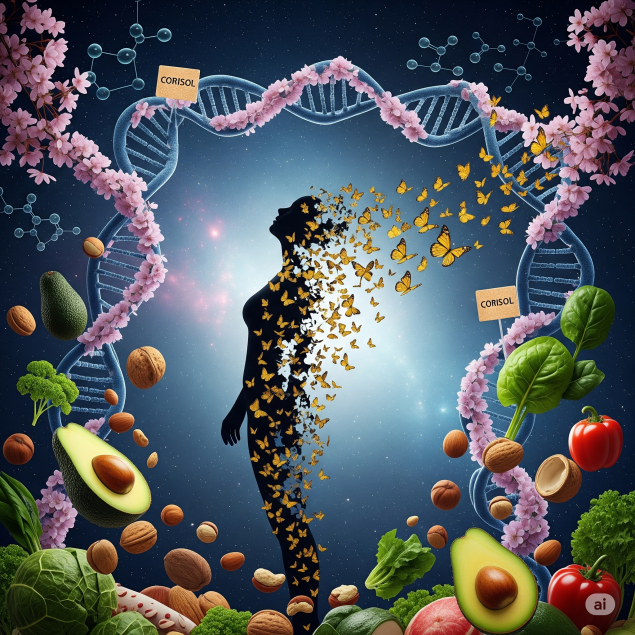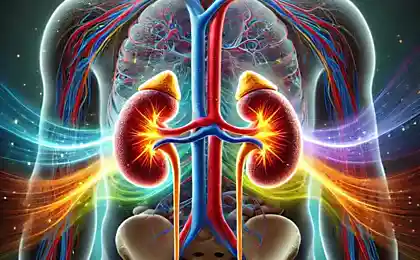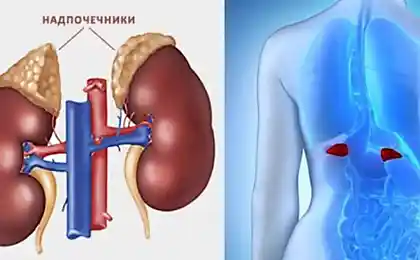204
5 Nutritional Changes to Help Reduce Stress Hormone Levels
To reduce the level of stress hormones, it is important not only to rest qualitatively, but also to monitor your diet.

The modern world constantly keeps us in suspense. Deadlines at work, an endless flow of information, family worries - all this leads to chronic stress, which literally poisons our body. When we experience stress, the adrenal glands produce cortisol, a hormone that in the short term helps to cope with the threat, but with prolonged exposure becomes a real destroyer of health.
Studies show that chronically elevated cortisol levels are linked to obesity, depression, cardiovascular disease and even premature aging.
Many people try to deal with stress through meditation, yoga, or vacation, but they miss one of the most powerful tools of all: nutrition. What we eat directly affects our hormonal state. A properly selected diet can become a natural antidepressant and mood stabilizer.
1. Increase your intake of magnesium, a natural relaxant
Magnesium is often called "a mineral of tranquility"And it's no accident. This trace element is involved in more than 300 biochemical reactions in the body, including the regulation of the nervous system and the production of neurotransmitters responsible for good mood.
Scientific fact: Magnesium deficiency is observed in 75% of the population of developed countries. With a lack of this mineral, the body becomes more sensitive to stress, and cortisol levels rise even with minimal irritants.
The best sources of magnesium:
- Dark chocolate (at least 70% cocoa) 64 mg per 28 g
- avocado 58 mg in one medium fruit
- Nuts (almonds, cashews) - 80-95 mg per 28 g
- spinach 157 mg in one cup of boiled spinach
- Quinoa. 118 mg in one cup of cooked cereals
Lifehack: Start the day with a smoothie of spinach, avocado and almond milk. This will give you about 200 mg of magnesium – a quarter of the daily allowance for an adult.
2. Add Adaptogens – Plant Stress Protectors

Adaptogens are a class of plants that help the body better cope with stress. They work at the level of the hypothalamic-pituitary-adrenal axis, modulating the production of cortisol and other stress hormones.
The history of adaptogens goes back thousands of years. In ancient Chinese medicine, ginseng was considered the elixir of youth, and in Ayurveda, ashwagandha was used to restore the strength of warriors after battles. Modern science has confirmed the wisdom of our ancestors.
Top 5 Adaptogens to Reduce Stress:
- ashwagandha Reduces cortisol by 30% in 60 days of use
- Rhodiola pink Improves stress resistance and physical endurance
- ginseng stabilizes blood sugar levels and reduces inflammation
- Tulsi (sacred basil) Natural antidepressant
- shizandra Protects the liver and improves adaptation to stress
A study published in the Indian Journal of Medical Research found that taking ashwagandha regularly for 8 weeks reduced blood cortisol levels by 27.9% compared to placebo.
3. Stabilize blood sugar levels
Sharp jumps in blood glucose are one of the main triggers of cortisol release. When sugar levels drop, the body perceives this as a threat and triggers a stress response. Therefore, maintaining stable glucose levels is critical to controlling stress hormones.
Rule of 3 macronutrients: Each meal should contain proteins, healthy fats and complex carbohydrates. This ensures a slow and uniform supply of glucose into the blood.
Consider an example of a typical “stress” breakfast: a sweet bun with coffee. After 30 minutes, the sugar level jumps and then drops sharply, causing a release of cortisol and adrenaline. A person feels irritability, fatigue and craving for sweets.
Alternative: an omelet with avocado and whole grain bread. Proteins from eggs provide a stable level of amino acids, avocado fats slow down the absorption of carbohydrates, and fiber from bread prevents sudden jumps in glucose.
Products to stabilize blood sugar:
- Squirrels: fish, birds, eggs, legumes, nuts
- Healthy fats: avocado, olive oil, chia seeds
- Complex carbohydrates: oatmeal, quinoa, sweet potatoes
- Fiber: vegetables, fruits, whole grains
4. Include omega-3 fatty acids – anti-inflammatory allies
Chronic stress leads to systemic inflammation in the body, which in turn maintains high levels of cortisol. Omega-3 fatty acids act as natural anti-inflammatory agents, breaking this vicious cycle.
A meta-analysis of 19 studies found that omega-3 supplements reduced cortisol levels by an average of 19% and significantly improved anxiety scores.
Especially important are long-chain omega-3s: EPA (eicosapentaenoic acid) and DHA (docosahexaenoic acid). These compounds directly affect the brain, improving the transmission of nerve impulses and reducing the production of pro-inflammatory cytokines.
The best sources of omega-3:
- Fatty fish: salmon, sardines, mackerel (2-3 times a week)
- Chia seeds: 1 tablespoon contains 5 g of omega-3
- Walnuts: 28 g provides a daily allowance
- Flaxseed: ground, 1-2 tablespoons per day
- Algae: Nori, Spirulina (for vegetarians)
Advice from nutriciologists: If you don’t eat fish regularly, consider a quality fish oil supplement. Choose foods with an EPA:DHA ratio of 3:2 and a dosage of at least 1,000 mg per day.
5. Limit caffeine and add herbal teas
Caffeine stimulates cortisol production, especially in people already under chronic stress. The paradox is that the more we get tired, the more we drink coffee, creating a vicious cycle of stress and exhaustion.
A study conducted at Duke University found that daily caffeine intake equivalent to 4 cups of coffee increased cortisol levels by 30% during the day. At the same time, the effect accumulates - the longer a person drinks a lot of coffee, the more disturbed the natural rhythm of hormone production.
Replacement strategy: Do not give up coffee abruptly - it can cause withdrawal syndrome. Gradually replace one cup of coffee a day with herbal tea. After 2-3 weeks, your nervous system adapts.
Herbal teas to reduce stress:
- Chamomile tea: contains apigenin, which binds to GABA receptors in the brain
- Lavender tea: reduces the activity of the sympathetic nervous system
- Passiflora tea: increases GABA production
- Green tea: contains L-theanine, which neutralizes the effects of caffeine
- Lemon melissa tea: has a mild sedative effect
The success story of one of our readers: Anna, a 34-year-old marketing manager, suffered from chronic fatigue and anxiety. She drank 6 cups of coffee a day to keep her working. After switching to herbal teas and limiting coffee to 2 cups in the morning, she noted a significant improvement in sleep and a decrease in anxiety a month later.
The golden rule of caffeine: Drink the last cup of coffee or black tea no later than 14:00. The half-life of caffeine is 5-6 hours, so evening coffee can disrupt sleep even if you don’t notice it.
The path to hormonal balance begins with a plate.
Reducing stress hormone levels through diet is not a quick fix, but a lifestyle. Changes in health you will feel after 2-3 weeks, but a stable result will require 2-3 months of consistency. Remember: each meal is an opportunity to support your nervous system or, conversely, increase stress. The choice is yours.
Glossary of terms
Cortisol is the main stress hormone produced by the adrenal cortex. Normally regulates metabolism, immune response and blood pressure.
Adaptogens are a class of plant compounds that help the body adapt to various types of stress and maintain homeostasis.
GABA (gamma-aminobutyric acid) is the main inhibitory neurotransmitter of the central nervous system, responsible for relaxation and reducing anxiety.
The hypothalamic-pituitary-adrenal axis is an organ system that regulates the body's response to stress through hormone production.
L-theanine is an amino acid found in green tea that promotes relaxation without drowsiness and neutralizes the stimulating effect of caffeine.
Omega-3 fatty acids are essential polyunsaturated fatty acids that have anti-inflammatory properties and are important for brain function.
Cytokines are immune system signaling proteins that can be pro-inflammatory or anti-inflammatory.
How to find the courage to face something you’ve been avoiding for so long
Advice from people who got out of poverty on their own























